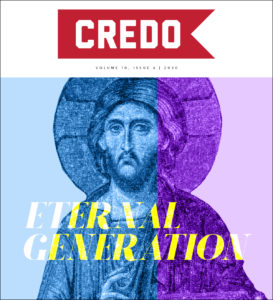
The Catholic Puritan: John Owen on Eternal Generation
T he new issue of Credo Magazine focuses on the eternal generation of the Son. The following is an excerpt from one of the issue’s featured articles by Ryan McGraw. McGraw is the Morton H. Smith Professor of Systematic Theology at Greenville Presbyterian Theological Seminary in Taylors, SC. He is the author of numerous books including By Good and Necessary Consequence, The Day of Worship: Reassessing the Christian Life in Light of the Sabbath, and Christ’s Glory, Your Good: Salvation Planned, Promised, Accomplished, and Applied.
he new issue of Credo Magazine focuses on the eternal generation of the Son. The following is an excerpt from one of the issue’s featured articles by Ryan McGraw. McGraw is the Morton H. Smith Professor of Systematic Theology at Greenville Presbyterian Theological Seminary in Taylors, SC. He is the author of numerous books including By Good and Necessary Consequence, The Day of Worship: Reassessing the Christian Life in Light of the Sabbath, and Christ’s Glory, Your Good: Salvation Planned, Promised, Accomplished, and Applied.
Eternal life involves knowing the right God in the right way. This boils down to knowing the true God and his Son Jesus Christ, who is the only mediator between God and man (Jn. 17:3; 1 Tim. 2:5). Eternal generation teaches us who the mediator is as the eternal Son of God. Taking on human flesh, Christ’s humanity was the humanity of God the Son. His deity meant that he was worthy to offer himself to God for us to remove the guilt and consequences of our sin. It was necessary for him to be man, however, so that he could represent us as a new and better Adam. As Thomas Manton (1620-1677) explained, God cannot die, but he who was God died for us. Eternal generation tells us something about who Christ is as God in relation to his Father. We need to understand who he is in himself in order to understand why he works the way he does for us. Ultimately, God does what he does, because he is who he is.
John Owen’s (1616-1683) treatment of the eternal generation of the Son is relatively unremarkable, yet it is clear. It is unremarkable because it was standard Christian theology. Yet Owen can help us understand clearly what eternal generation means and why it is important. I will show below that Owen taught that eternal generation meant that the Son is God equal with the Father by eternal communication of the divine essence from Father to Son. After outlining Owen’s teaching briefly, I will conclude by evaluating the importance of eternal generation for understanding who God is and why he works the way that he does.
Owen on Eternal Generation
John Owen’s treatment of the eternal generation of the Son is relatively unremarkable, yet it is clear. It is unremarkable because it was standard Christian theology. Click To Tweet Owen explained eternal generation in terms of an eternal order among the Father, the Son, and the Holy Spirit. I will summarize his treatment of the topic to three points, taking from various parts of his writings, can help show what eternal generation means.
The first point of importance is Owen’s assertion that there is no such thing as an eternal Father without an eternal Son. He wrote, “Whoever denies Christ the Son, as the Son, that is, the eternal Son of God, he loses the Father also, and the true God; he hath not God. For that God which is not the Father, and which ever was, and was not the Father, is not the true God.” Targeting the Socinians, who were the Unitarians of his day, the point is that if we deny that the Son is co-equal with the Father from all eternity, then we lose the deity and personhood of the Father along with the Son. An eternal Father presupposes an eternal Son. Eternal generation means that there was never a time when the Son was not God equal with the Father, without subordination. Yet full equality with the Father does not erase the eternal order of subsistence in the Trinity. The Son is of the Father by eternal generation, while the Spirit is of the Father and the Son by eternal procession. The assertion here is that he who denies the Son does not have the Father either (1 Jn. 2:23).
The second major issue is that the Son is of the Father from all eternity. Owen used widely accepted language of the Father as the fount or origin of the Trinity, or of the deity. Eternal generation described the sense in which the Son was God equal with the Father. Owen explained this by stating that the Son was God of the Father because the Father communicated to him “the whole entire divine nature.” This meant that eternal generation referred to an eternal communication of the whole divine essence from the Father to the Son. Eternal generation constitutes the personhood of the Son, because, while the divine persons are distinct in their order and personal relations to one another, personhood and essence cannot be divided in the Trinity.
We need a whole Trinity to save us wholly, and we need to come to God respecting the eternal order of the divine persons. Click To Tweet The person begotten is a divine person. The Son is God as begotten of the Father, and the Spirit is God as proceeding from Father and Son. This is why the generic term, “God,” in the New Testament refers primarily to the Father as representing the majesty of the entire Trinity. Others, such as John Calvin (1509-1564), argued that eternal generation meant that the personhood of the Son was of the Father, but that his deity was not, which resulted in long-lasting controversy. Yet Owen’s view was the majority position in Western Trinitarian thought, and most Reformed authors taught the same thing. While divine attributes cannot be communicated or conveyed to creatures (not even to Christ’s human nature), the Father communicates the whole divine nature to the Son in eternal generation. The Father has life in himself as the eternal God, and he has granted the Son to have life in himself as the eternal second person in the Trinity, equal with the Father in divine glory (Jn. 5:26).
**Read the remainder of Ryan McGraw’s article in the latest issue of Credo Magazine.

